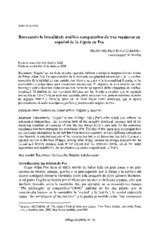Recreando la irrealidad: análisis comparativo de tres versiones en español de la Ligeia de Poe
Autor
Rivas Carmona, M. del Mar
Editor
UCOPressFecha
2008Materia
TraducciónRelato gótico
Registro y discurso
METS:
Mostrar el registro METSPREMIS:
Mostrar el registro PREMISMetadatos
Mostrar el registro completo del ítemResumen
"Ligeia" es, sin duda, el relato que más fielmente refleja la imaginación sin límites de Edgar Allan Poe. La reproducción de la intricada complejidad estructural y de la confusa sensación de irrealidad de este cuento, que elevó a su autor a la inmortalidad literaria, se ha convertido en ardua labor para numerosos traductores. El objetivo de este estudio ha sido investigar cómo distintas traducciones han recreado en español dicha atmósfera de confusa irrealidad. El análisis de tres versiones distintas nos ha llevado a concluir que la reputada traducción de Julio Cortázar es la más acertada, entre otros motivos, porque mantiene siempre un registro formal y literario, tanto en un nivel léxico corno sintáctico, que se ajusta perfectamente al estilo descriptivo, poético y pictórico del original de Poe. Undoubtedly, "Ligeia" is one of Edgar Allan Poe's tales which best reflects his unbounded imagination. The remaking both of the complex structural intricacy and of the muddling sensation of unreality of this tale has always been a hard task for the numerous translators that have attempted the translation of it. The aim of this paper is to investigate how the confusing atmosphere in the tale has been actually recreated in three different translations into Spanish. A detailed analysis of the versions has led us to determine that Julio Cortázar's reputed version is the best of them, among other things because he always accounts for the formal and literary register, both at the lexical and the syntactic levels, which we judge appropriate and suitable for the descriptiva and poetic original style of Poe's.

